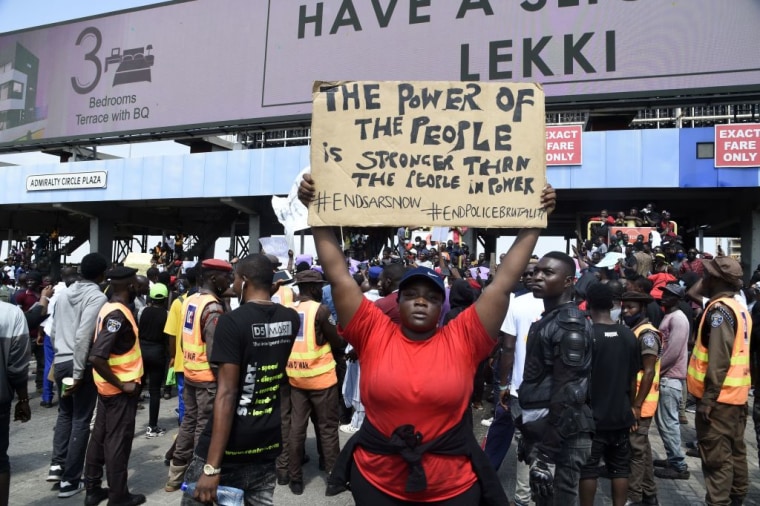 PIUS UTOMI EKPEI / AFP
PIUS UTOMI EKPEI / AFP
What is SARS?
SARS was first formed in 1992 to target violent crime in the Nigerian capital, Lagos. It operated anonymously, with its 15-member team patrolling the streets in plain clothes and traveling in unmarked buses.
This past weekend, the Nigerian government confirmed that the country’s police unit Special Anti-Robbery Squad (SARS) was to be disbanded. The unit is synonymous in the country with police brutality, and its abolition was the focus of a number of protests in recent weeks. Prominent Nigerian musicians including Burna Boy, WizKid, and Davido have spoken out in support of the protestors in Nigerian cities including Lagos and Abuja plus cities from the Nigerian diaspora, including Atlanta, Berlin, New York, and London.
Why are people protesting?
The protests began last week following reports that a young man in the Delta State of southern Nigeria had been killed during a stop-and-search operation. Police in Nigeria denied SARS involvement in the man's death.
Police harassment and abuse are often cited as a problem by young people in Nigeria with many claiming the SARS unit's crime-fighting tactics have warped into criminal behavior of their own. The New York Times suggests the SARS critics believe "its faceless nature opened the door to abuse, making it difficult to identify and report rogue officers and emboldening them to act with impunity." In June Amnesty International documented at least 82 alleged cases of “torture, ill treatment, and extra-judicial execution” by SARS between January 2017 and May 2020.
What have artists had to say about the protests?
“We are not scared to speak,” WizKid said at a protest in London on Saturday, October 10. “Nigerian youth, don’t let anyone tell you you don’t have a voice.” Mr. Eazi attended the same London protest and later wrote on Instagram: "We do not want a change of Name, we do not trust the words of persons who have gone back on their promises again & again! We do not Trust an organisation that Fires Teargas & Water Guns at Peaceful Protesters!! We want a total Institutional reform Not Just for The police but extended to Governance!!"
Wizkid telling London protesters that SARS has been dissolved. #EndSARS
— ZEUS (@itzbasito) October 11, 2020
pic.twitter.com/QtzdsOSQB7
On Monday, October 13, Davido shared live footage of his meeting with Inspector General of Police Mohammed Adamu where they discussed police reform and justice for the victims of police brutality.
Burna Boy, meanwhile, released a statement demanding more from those in a position of power. “In my opinion, abolishing [SARS] is a definite first step but we cannot afford to stop there,” he wrote. He also paid for a series of billboards carrying the #EndSARS hashtag around Nigeria and announced an initiative to help spread information and create “broader platforms to amplify the creative and tech community.”
Other musicians who have spoken out via social media include Cardi B and Chance The Rapper.
#EndSARS NOW #ENDSARSNOW
— Chance The Rapper (@chancetherapper) October 9, 2020
I just started reading up on this travesty taking place in Nigeria. If you have more info to dispense in the replies I’m all ears https://t.co/SKZIizxHE8
What’s going ? Can you give me a summary so I can research later ....you know I love Nigeria 🇳🇬 https://t.co/jHKFS3M1K2
— iamcardib (@iamcardib) October 8, 2020
What happens next?
That is the big question. The feeling in Nigeria is that police brutality and the poor treatment of Nigerian people runs deeper than just the police force. SARS was reformed in 2017 following a previous wave of protests, however, allegations of abuse continued. Amnesty International is pushing for the prosecution of a number of SARS officers, the majority of whom have been deployed in other police departments. Protesters also want to see the government address broader problems with the police in addition to offering compensation for victims of police violence and better pay for police officers as a means of reducing the risk of civilians being exploited financially.